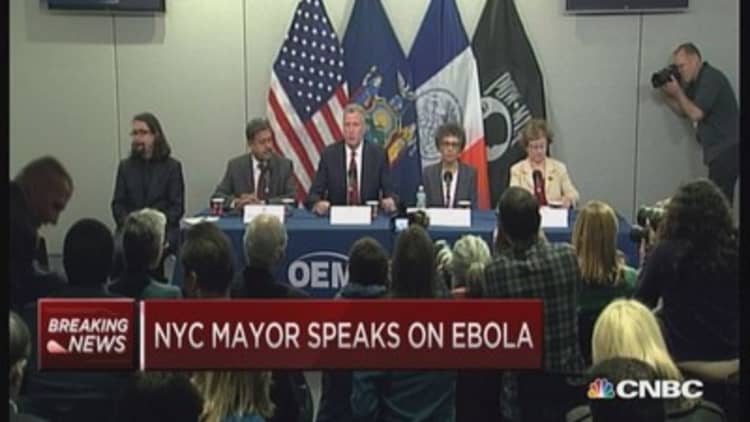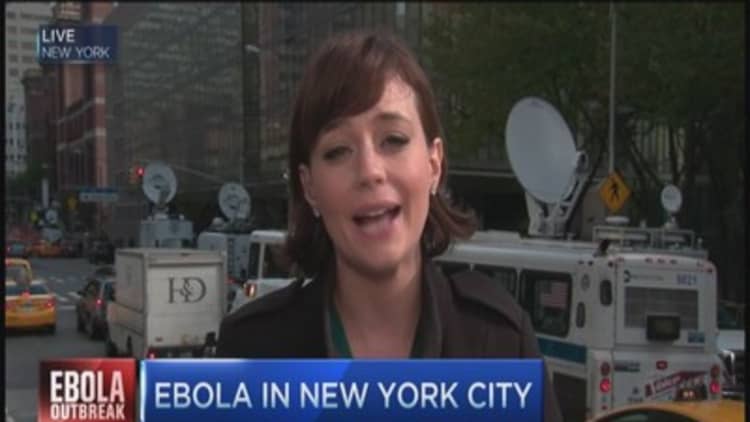
No strangers to crises, New York City tourism officials barely blinked Friday when faced with news that the city has its first confirmed case of Ebola.
"There is no reason for New Yorkers to change their daily routine in any way," New York City Mayor Bill de Blasio said at a news conference at Bellevue Hospital, where Dr. Craig Spencer was being treated for the virus after working for Doctors Without Borders in Guinea.
The city, which has dealt with terror attacks, anthrax, blackouts, bedbugs, rats and Superstorm Sandy in recent years, has nonetheless continued to set and exceed its own tourism records.
Read MoreThe one thing guarding you from a bedbug apocalypse
Last year, New York City tallied 54.3 million visitors and is on track to see a record 55.8 million this year, according to NYC & Co, the city's official tourism marketing group. Officials for NYC & Co declined to respond to requests for comment on Ebola on Friday, referring questions to the Mayor's Office. (It did, however, retweet a picture of the mayor riding the subway Friday morning.)
In Texas, which had the first case of Ebola in the United States, tourism officials have been tackling the issue head on, with an Ebola update front and center on the website operated by the Dallas Convention & Visitors Bureau.
Frank Librio, the vice president of communications for the Dallas Convention & Visitors Bureau, said there were inquiries from some members of groups before they traveled to Dallas, but there were no cancellations of conventions or meetings that he's aware of. "We really lucked out," he said.
So far, hotel occupancy numbers don't seem to be affected either.
"The latest hotel performance data from STR indicates Ebola has had no effect on the U.S. hotel industry's three major metrics—occupancy, average daily rate and revenue per available room," a spokesman for the hotel research firm said in an email to CNBC.
After the Sept. 11 terrorist attacks in 2001, New York City hotels saw an occupancy decline for about a year, according to data collected by STR. The steepest drop, a 27.5 percent year-over-year decline for the month of September, meant the city's 78,568 hotel rooms were only 65 percent full that month. By December it was already back to 69 percent.
The most recent numbers from STR, for September 2014, show NYC hotel occupancy at 88.9 percent for its 112,803 rooms.
Read MoreBusiness travelers are spending more but taking fewer trips
So far, restaurant owners aren't voicing concerns either.
"Right now, in the short term, I haven't heard of any immediate or direct impact," said Chris Hickey, the regional director for the New York State Restaurant Association. His group had been in contact as recently as Friday morning with the New York City Office of Emergency Management, which he said has been very reassuring that the situation is under control, contained, and restaurants don't need to take any precautions beyond what they normally do under health code rules.
Read MoreShut the borders on Ebola? Don't bet on it
Health officials have repeatedly said the general public has nothing to be concerned about unless they've come into direct contact with the bodily fluid of an infected person. And as weird as some New York City offerings can be, not too many of the mainstream tourist offerings promote that type of interaction.
"We are operating as usual and expect to continue doing so," said spokeswoman Margaret Doyle at the Museum of Modern Art.

—Follow Road Warrior on Twitter at @CNBCtravel.


